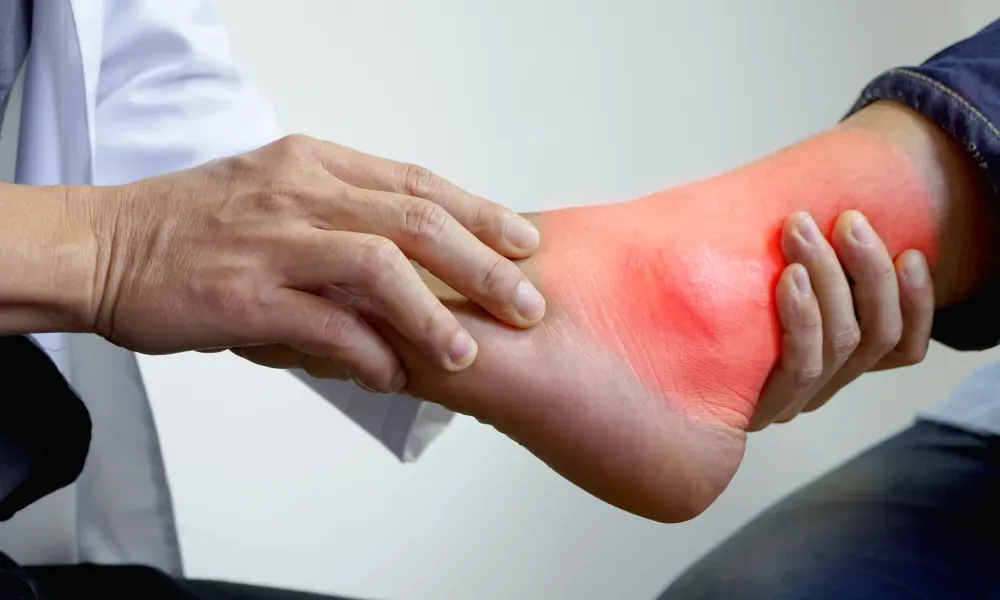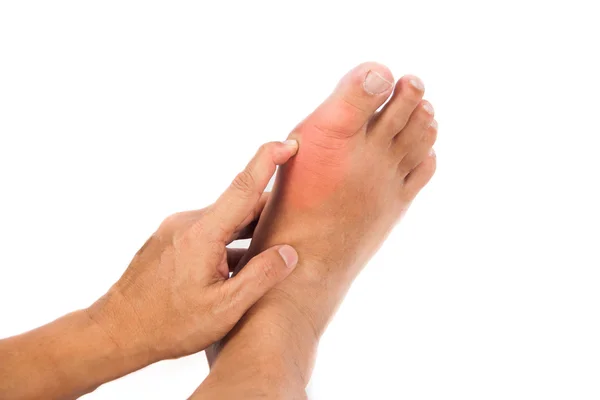Gout: A Comprehensive Guide to Understanding and Managing the Condition
- By: admin
- On:

Does your big toe appear bulged and painful? Does the excruciating pain negatively impact your quality of life? What you notice may be due to a medical condition known as gout. Gout is a painful and potentially debilitating form of arthritis that affects millions of people worldwide. It is characterized by sudden and severe attacks of pain, swelling, and inflammation in the joints, often beginning in the big toe.
In this article, the podiatrists in Maryville, IL, will delve into the world of gout, exploring its causes, symptoms, diagnosis, treatment options, and management strategies. So keep scrolling!
What is gout?

Gout is a form of inflammatory arthritis that causes pain and swelling in your joints. This usually occurs due to an abnormal buildup of uric acid in your body. Gout commonly affects your big toe joint, but it can affect other joints, including:
- Knee
- Ankles
- Feet
- Elbows
- Hands and wrists
What causes gout?
Your body naturally makes uric acid that is broken down into by-products called purines. These are filtered out of your body by your kidneys. Gout occurs when there is an excess of uric acid in the body which is not able to be flushed out of your body through the kidney. The uric acid forms crystals and settles into your joints.
Risk factors for increased uric acid buildup include:
- Genetics
- Obesity
- Diet (consumption of red meat, seafood, and drinks sweetened with fructose)
- Medical conditions
- Diabetes
- High blood pressure
- Obesity
- Kidney disease
- Alcohol consumption (especially beer)
- Certain medications like immunosuppressants, diuretics
What are the symptoms of gout?
The symptoms of gout can be severe and debilitating, including:
- Intense joint pain, often in the big toe
- Swelling and inflammation in the affected joint
- Redness and warmth in the affected joint
- Limited range of motion in the affected joint
- Fatigue
- Fever
How do doctors diagnose gout?
Your foot doctor can diagnose gout through the following:
- Symptom assessment
- Recording medical history
- Conducting physical examination
- Ordering imaging tests (e.g., X-rays, ultrasounds, CT, MRIs)
- Running blood tests (e.g., uric acid levels)
- Performing joint fluid analysis
What are the effective treatment options for gout?
Treatment plans for gout vary depending on the severity of the condition. Effective options may include:
Medications
- Nonsteroidal anti-inflammatory drugs (NSAIDs)
- Colchicine
- Corticosteroids
Lifestyle modifications
- Weight management
- Regular low-intensity exercise
- Stress reduction through techniques like Uogay, meditation
Dietary changes
- Reducing purine-rich foods (red meat, sugary drinks, etc )
- Increasing low-fat dairy consumption
Alternative therapies
- Acupuncture
- Massage
How to manage a gout attack?
When you have a sudden gout attack, you can manage your symptoms by:
- Avoiding sweet drinks and alcohol
- Drinking plenty of water
- Elevating your affected joints above the level of your heart
- Wrapping an ice pack in a thin towel and icing your affected joints
- Limiting stress on your affected joint by avoiding intense physical activities
Can you prevent gout?
Yes, you can prevent gout through a multifaceted approach, including:
- Educating oneself about the condition
- Working with a healthcare team to develop a personalized plan
- Engaging in regular exercise and physical activity
- Maintaining a healthy weight
- Practicing stress-reducing techniques
- Limiting alcohol and purine-rich foods
What foods can cause gout?
Eating and drinking foods high in purines can result in high uric acid levels in your body. These include:
- Sugary drinks and sweets
- Alcohol
- High fructose corn syrup
- Organ meats
- Red meat (beef, lamb, pork)
- Certain seafoods (scallops, tuna)
What are the complications of untreated gout?
If left untreated, gout can lead to serious complications, including:
- Recurrent gout attacks
- Advanced gout (tophi, kidney stones, kidney damage)
- Permanent joint damage
- Increased risk of other health conditions (e.g., metabolic syndrome, cardiovascular disease)
Final takeaway
Gout is a complex and multifaceted condition that affects millions worldwide. By understanding its causes, symptoms, diagnosis, treatment options, and management strategies, individuals can take control of their condition and improve their quality of life. Remember, with the right approach, it is possible to manage gout and live a fulfilling life.

